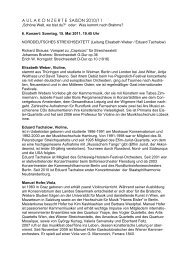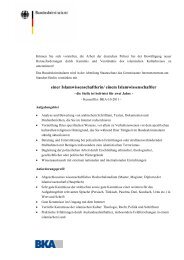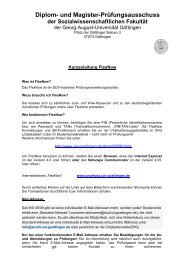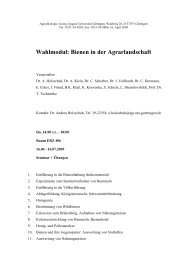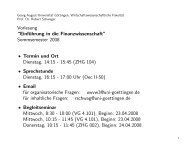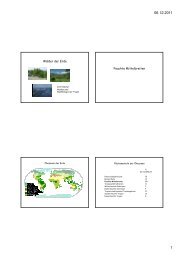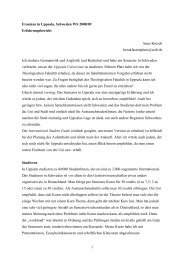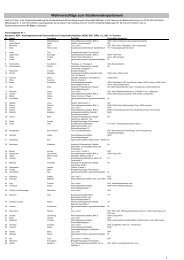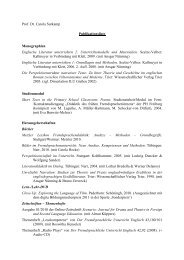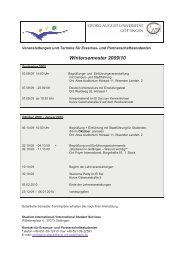The OMC inclusion and national social NGOs: From enthusiasm to ...
The OMC inclusion and national social NGOs: From enthusiasm to ...
The OMC inclusion and national social NGOs: From enthusiasm to ...
You also want an ePaper? Increase the reach of your titles
YUMPU automatically turns print PDFs into web optimized ePapers that Google loves.
sharp. In France, it is more fundamental which has <strong>to</strong> do with the poor institutionalised linkswith the state <strong>and</strong> its funding schemes. <strong>The</strong> government is accused of failing <strong>to</strong> make povertyeradication a strategic priority of its policy <strong>and</strong> the objectives mentioned, so <strong>NGOs</strong>, were notimplemented either through legislation or programmes. More concretely, they criticise that thegovernment would not properly address the two most significant crises, that is those ofunemployment <strong>and</strong> of (lack of adequate <strong>social</strong>) housing, but also the cutting-back of theuniversal health scheme (CMU) in 2003. <strong>The</strong> absence of a clear <strong>and</strong> precise financial planwhich would allow identifying how much money is spent on a particular policy is criticised asis the insufficient dialogue between <strong>NGOs</strong> <strong>and</strong> policy-makers, the shortage of time <strong>and</strong> thelack of public visibility of the process (EAPN 2003). Evidently, the German reaction is not asfundamental but still severe. Criticism focuses on the newly introduced so-called Agenda2010 <strong>and</strong> its poverty-enhancing effects which are not dealt with in the NAP, but also the overrelianceon work as a means of integration, simply not available for all people. Further pointsare the absence of policies for the most vulnerable, insufficient gender mainstreaming <strong>and</strong>consultation of civil society as well as the absence of concrete target setting, <strong>to</strong> name onlysome of them (BAGFW / NAK 2004).Finally, the lack of influence of <strong>NGOs</strong> on the implementation of the <strong>OMC</strong> <strong>inclusion</strong> is alsodetectable when looking at the new mainstreamed <strong>OMC</strong> <strong>social</strong> protection <strong>and</strong> <strong>social</strong><strong>inclusion</strong>. While all <strong>NGOs</strong>, as well as the French administration, have pled for a continuedseparated <strong>OMC</strong> <strong>inclusion</strong>, they did not succeed in rescuing the old <strong>OMC</strong> <strong>and</strong> are now dealingwith an <strong>OMC</strong> that covers such diverse issues as <strong>inclusion</strong>, health <strong>and</strong> pensions. <strong>The</strong> most citedreason for a separate <strong>OMC</strong> <strong>inclusion</strong> was the fear that in a streamlined <strong>OMC</strong> <strong>and</strong> next <strong>to</strong> thefinancially powerful issues of health <strong>and</strong> pensions, poverty <strong>and</strong> <strong>social</strong> exclusion matterswould receive even lower attention of the politicians.3.3 Evaluation of <strong>OMC</strong> <strong>inclusion</strong> by <strong>NGOs</strong>How do the <strong>NGOs</strong> evaluate the <strong>OMC</strong> <strong>inclusion</strong> process? With regard <strong>to</strong> the poor quality <strong>and</strong>degree of the consultation process <strong>and</strong> the quasi zero impact they had on the NAPs, theirevaluation is amazingly balanced which should be unders<strong>to</strong>od in the light of their interest <strong>to</strong>further develop the process. In both countries, more so in France, the underst<strong>and</strong>ing is thatthe political leadership had refused <strong>to</strong> take the NAPs as a reference <strong>and</strong> even <strong>to</strong> communicateabout it, thereby showing its lack of political support. <strong>The</strong> insufficient mobilisation of (all)ac<strong>to</strong>rs is also often mentioned, more so in Germany than in France. Here, <strong>NGOs</strong> find that theinsufficient consultation lead <strong>to</strong> an insufficient incorporation of their views. One interviewee



